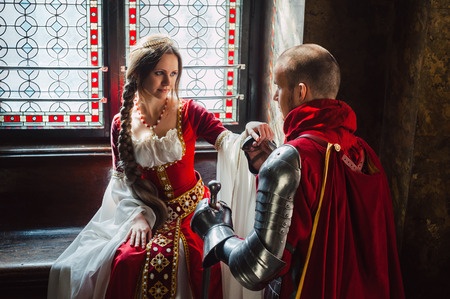Is Chivalry Dead?

When I think of all the categories I like to include myself in, one of them is “a feminist.” Another one is “a lady.”
I enjoy the surprise of having a door opened for me by a man, who, in my mind, immediately becomes “a gentleman.” As someone who believes in equality of personhood, the thought of requiring people to believe in and practice customs of chivalry seems odd, indeed.
Chivalry is Dead?
The word chivalry brings to mind gallant knights rescuing damsels in distress. Although the word itself is still closely connected to the order of knighthood, it feels a bit antiquated when associated with rescuing or extending courtesies to women.
When the feminist movement went into full swing in the 1970s, some women began rejecting acts of chivalry. Until then, men were known to:
- Hold doors open
- Take a lady’s coat when they were out and be responsible for getting it back to her (and putting her back into it)
- Carry books, bags, and packages
- Help push a lady’s chair in when she sits down at a table
- Open car doors
- Stand when a lady entered a room, or when she stood, and remain standing until she sat
- Shake a lady’s hand only when she offered it first
Each of these acts are admirable and based on the desire to show respect. But from a modern perception, they may also highlight the idea that women are weak or vulnerable.
Over time, as the appreciation for these indulgences faded, many men have ceased extending them. Thus, leading to the lament, “Chivalry is dead.”
The Equality Adjustment
I collect etiquette books. Checking all of them, I failed to find the word “chivalry,” except in Letitia Baldridge’s New Complete Guide to Executive Manners. The chapter title is, “Chivalry Isn’t Dead. It’s Just No Longer Gender-Based.”
What a revelation!
Though we still have a way to go as far as gender equality goes, there is no reason to exclude kindness and consideration to everyone equally.
Think of it this way: if “chivalry” is used synonymously with “civility”, then perhaps it isn’t dead at all!
Maintaining a personal rule to use kindness in every interaction, and remaining mindful of the needs of other people, helps ensure that anyone who needs assistance will receive it regardless of gender.
In an equally chivalrous society, expressions of courtesy may look like this:
- If you arrive at a door first, open it for the person behind you
- If you are closest to the elevator door when it opens, you exit first, or step out or aside so those exiting can get by you
- Noticing others have been standing for a bit, you offer your seat
- If someone is having a difficult time with a chair, you assist that person as a kind gesture
- When you tell someone you intend to do something, you keep your word
- Extend your hand for a friendly handshake when meeting or greeting someone
A Continuous Evolution
As humanity evolves, so does chivalry. Our attitudes and acceptance of one another as individuals determine the degree of this evolution, but there is one constant that I feel should remain: respect.
Respect for our fellow humans is anchored in kindness and compassion. Etiquette rules and acts of chivalry may evolve, but as long as they exhibit respect, we will get along just fine.
You may also enjoy reading . . .














